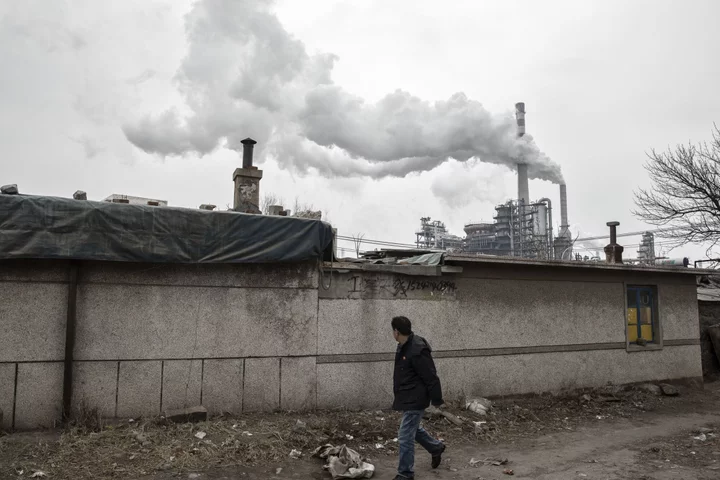Even as Britain prepares to bake again this weekend, the country is not geared up any better for wildfires than it was last year which saw a record number of fire incidents and forced dozens to flee their homes.Wildfires are becoming unsettlingly more common in the UK and threatening to scorch its towns and cities — something that wasn’t the case before. As another sweltering summer begins, academics and watchdogs told Bloomberg News that preparedness for this year’s wildfires risk continues to be underwhelming. The UK government’s Home Office still relies on a four-page document from 2021 detailing its wildfire strategy, despite the government’s own climate advisor stating preparations are insufficient. To top that, the country has fewer firefighters now than it did a decade back.“The climate is altering our landscape much faster than we are trying to catch up,” said Guillermo Rein, a professor of fire science at Imperial College London, whose research shows that there have been at least three “fire waves” in the city linked to heat and dry weather in the past decade. “The situation is picking up faster than even fire experts had expected for the UK.”Read More: UK Heads for Another Sweltering Summer Driven by Global WarmingAmid record-breaking temperatures in Britain last year, July 19 turned out to be a tipping point. A fire started spontaneously in a compost bin at Wennington in East London and spread to surrounding fields and hedges. At least 60 homes were destroyed in similar fires across the country on that day, making it London Fire Brigade’s busiest day since the Second World War. The causes of those fires are still not known though some clarity may emerge from a London Fire Brigade review of last year’s blazes that’s expected to come out next month. The report will also include recommendations on how to prepare and respond to wildfires, enhance training or resource allocations, based on last summer’s learnings.Improving ResilienceThe Home Office said in an emailed response that its wildfire framework ensures it can respond to any emergencies this year. It added that it’ll implement “relevant policy recommendations” based on feedback from the National Fire Chiefs Council after 2022’s wildfires but didn’t share details of what changes are expected. A March 2023 report from the Climate Change Committee, the UK government’s official adviser, had urged them to “create and implement a cross-departmental strategy” in order to “urgently to improve our resilience to extreme weather.” The current framework doesn’t specify what each department will do, when, and how, the Climate Change Committee said in an email. There is a need to determine the scale of the risk in the current as well as in different warming scenarios, according to Brendan Freeman, an analyst with the Climate Change Committee said.The policymakers must engage with scientists to understand "the fire triangle, or the interaction between weather, fuel and topography,” which are the three elements of wildfire risk, Freeman said. The information also has to be “spatially explicit,” he said, as there’s no comprehensive map right now showing areas or communities most prone to these blazes.Read More: First Heat Wave This Year Declared in London and Across UK
Europe is emerging as the fastest-warming continent in an already warming planet, making countries like the UK more vulnerable to extreme climate events including heat waves and wildfires. Water shortages have already begun this year, triggering the risk of droughts. Last year was a perfect storm of winds, drought and heat, which made trees and fields more likely to catch and spread fire. Research shows such incidents are likely to become more common. While wildfires are not new to Britain -- these are common on moorland and heathland — it is rare to see them destroy residential areas, underscoring how climate change is literally searing people’s doorsteps now.
Firefighters across Europe are demanding more resources as the rising threat of wildfires strains these frontline workers. The European Union announced a doubling of its aerial firefighting fleet for this season to 24 airplanes and four helicopters. Still, firefighters unions from 15 countries affiliated to the European Public Service Unions said that wasn’t enough.The UK, on the other hand, has 21% fewer firefighters now than 10 years ago, blunting its ability to respond to major fire incidents. Central funding for fire and rescue services in England fell by almost a quarter over the last decade in money terms, according to the Fire Brigades Union. Fire services will receive around £2.6 billion ($3.3 billion) in 2023-24 from federal and local governments, the Home Office said in the email. That’s a mere increase of 4% from the preceding year and well below the inflation rate.
Local authorities in some places are implementing measures to reduce the risk of wildfire. Havering Council, the area including Wennington which was scorched last year, is cutting grass and installing “firebreaks” -- gaps in vegetation to halt the spread of fire -- on private land, to prevent another incident. “We are waiting for the official report from the London Fire Brigade into the cause of last year’s fire, so it’s difficult to agree on other specific prevention actions, without knowing in further detail how the fire started and spread”, said Ray Morgon, the council leader.Read More: London Fires Break Out as Record Heat Sparks Major Incident
The country overall needs a strategy to identify high-risk areas, assess extra resources needed and lay down how departments should share information. Landowners have to be encouraged to develop wildfire resilience plans and eschew activities that increase risk, like escaped fires from grouse moors.
The British public is also not as attuned to the risks as people in fire-prone areas like California or southern Europe. In Spain, for example, there are tough restrictions on barbecues and campfires in public places in the summer months.In California, householders are encouraged to cover vents and replace walls and rooves built with flammable materials, and legally required to clear dead leaves, mow grass and trim trees to protect properties. There are TV advertisements in Australia and New Zealand or instructions at a camp site on what one can and can't do. Little of this happens in the UK. A national analysis of wildfires, where they are starting and spreading, and what is causing land to become flammable, would help people understand how to protect themselves and their homes as well as bolster evacuation plans, according to Rein.“Last summer, brutal fire service cuts left us unprepared for soaring temperatures. The government must learn from these failures,” said Matt Wrack, general secretary of the Fire Brigades Union. “Tinkering round the edges just won’t cut it when we’re facing a climate emergency.”









